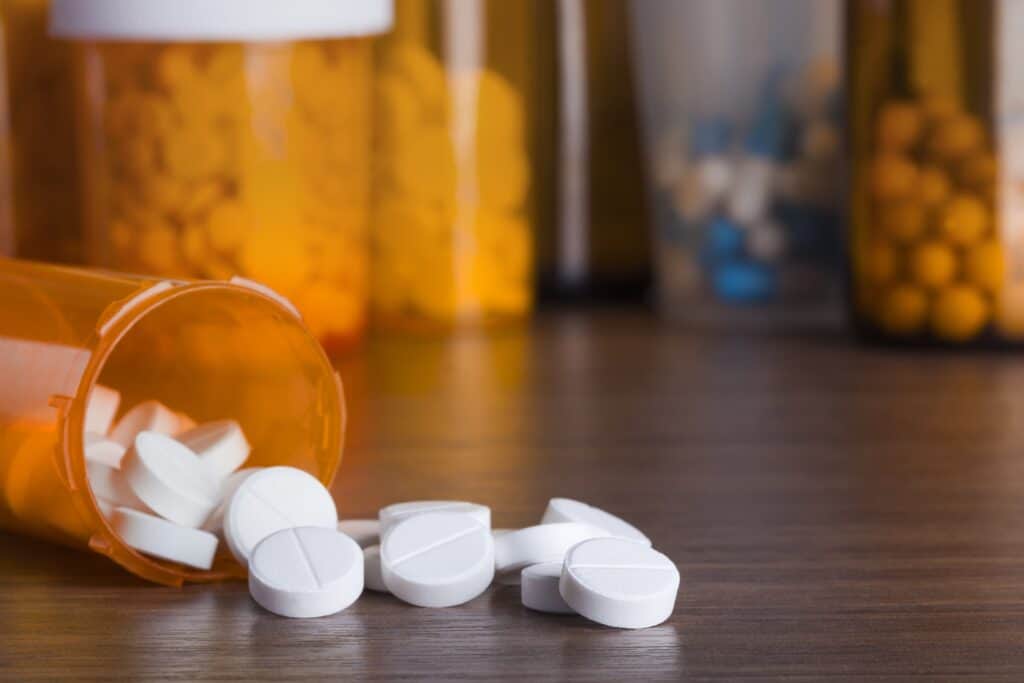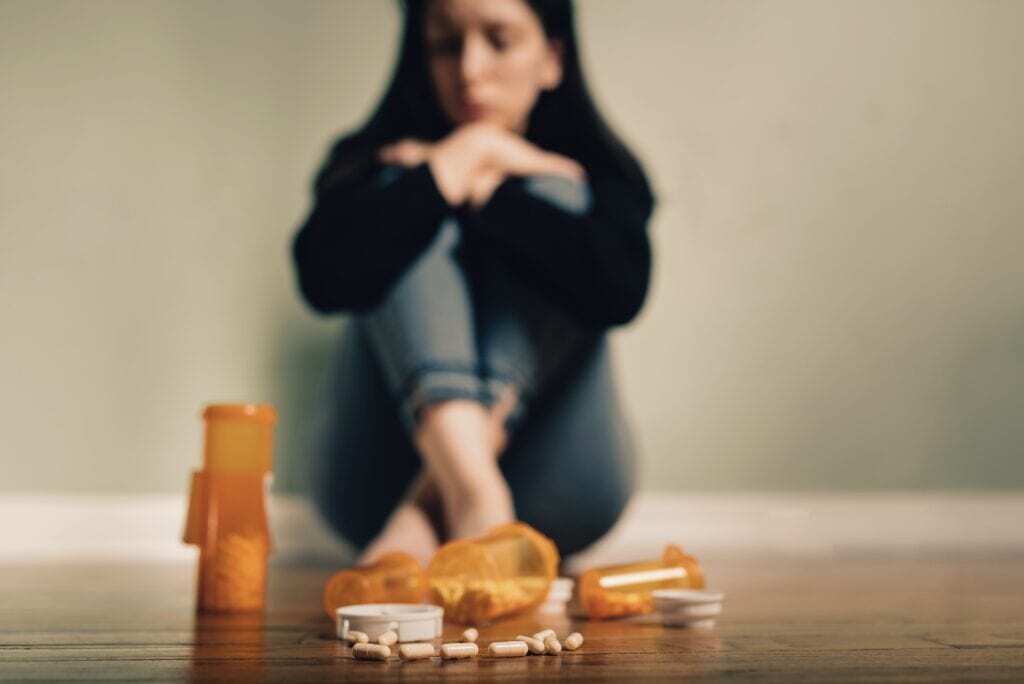Prescription Drug Rehab in Louisville, KY
Prescription drug misuse involves taking medication in ways not prescribed, such as exceeding the recommended dose or using someone else’s prescription. This can be an attempt to self-medicate or seek euphoria. At Louisville Addiction Center, we specialize in treatment for prescription drug addiction, offering a path to recovery in Louisville, Kentucky.
Our program addresses the underlying causes of addiction, ensuring a successful return to personal well-being. Additionally, we provide various levels of care, including Partial Hospitalization (PHP) and Intensive Outpatient Treatment (IOP). For more information about our prescription drug addiction rehab and to start your journey towards a healthier life, contact us today.

Examples of Commonly Misused Prescription Drugs
There are three main categories of prescription medication. The three medications that are most commonly misused include:
- Opioids — Prescription opioid narcotics, also known as painkillers, are typically prescribed to treat moderate or severe pain.
- Stimulants — Prescription stimulants, most commonly prescribed to treat attention deficit disorders like ADHD, have a high potential for misuse.
- Central Nervous System (CNS) Depressants — CNS depressants include sedatives, hypnotics, and tranquilizers. This type of medication is typically prescribed to treat sleep-related issues like insomnia and anxiety disorders.
Prescription drugs are among the most widely misused chemical substances in the country. An estimated 5.1% of Americans over the age of 12 reported misusing a psychotherapeutic drug at least once within the past month. Fortunately, with the right tools, prescription drug addiction can be successfully overcome.
Prescription Opioids
Painkillers include medications like:
- Oxycodone (OxyContin, Percocet)
- Hydrocodone (Vicodin)
- Morphine
- Codeine
- Fentanyl
Generally speaking, prescription opioids are effective for the treatment of moderate or severe pain when taken as prescribed. However, painkillers are highly addictive and potentially dangerous. The Centers for Disease Control and Prevention (CDC) reports, “In recent years, there has been a dramatic increase in the acceptance and use of prescription opioids for the treatment of chronic, non-cancer pain, such as back pain or osteoarthritis, despite serious risks and the lack of evidence about their long-term effectiveness.” Approximately 16,706 people died from a prescription opioid overdose in 2021 alone.
Benzodiazepines
Benzodiazepines are most commonly prescribed for the treatment of moderate or severe anxiety disorders and sleep-related issues like insomnia. However, they might also be prescribed to treat severe symptoms of alcohol withdrawal. The most commonly prescribed benzodiazepines are:
- Alprazolam (Xanax)
- Lorazepam (Ativan)
- Diazepam (Valium)
- Clonazepam (Klonopin)
Benzodiazepines are highly addictive. Generally speaking, they are only prescribed for short periods of time to treat severe anxiety and panic disorders. For example, a psychiatric professional might prescribe Xanax, instructed to be taken at the onset of a panic attack. Taking Xanax consistently for more than two weeks can lead to dependence.
Consistently taking a high dose of a benzodiazepine medication results in a range of side effects and health-related issues. In some cases, taking a high dose of a benzodiazepine medication can be lethal. Approximately 12,499 people died from an overdose involving benzodiazepines in 2021. Most benzodiazepine overdose deaths involve other prescription medications, specifically opioid painkillers.
Prescription Stimulants
Prescription stimulants are most commonly prescribed to treat ADHD and narcolepsy. The most commonly prescribed stimulants include:
- Amphetamine/dextroamphetamine (Adderall)
- Methylphenidate (Concerta, Ritalin)
- Lisdexamfetamine (Vyvanse)
The National Institute on Drug Abuse (NIDA) states, “When misusing a prescription stimulant, people can swallow the medicine in its normal form. Alternatively, they can crush tablets or open the capsules, dissolve the powder in water, and inject the liquid into a vein. Some can also snort or smoke the powder.” People can overdose on prescription stimulants when they are taken in extremely high doses.
Prescription stimulants are highly addictive and widely misused. In fact, among people aged 12 or older in 2021, an estimated 0.5% (or about 1.5 million people) had a prescription stimulant use disorder in the past 12 months.
Prescription Drug Addiction
Prescription drug addiction can be difficult to detect, especially if a person is misusing a prescription drug that was originally prescribed to them for a legitimate medical condition. However, the signs and symptoms associated with prescription drug addiction vary depending on the type of prescription drug being misused. Treatment for prescription drug addiction is important for individuals exhibiting the following symptoms.
Common symptoms of prescription opioid addiction include:
- Constipation.
- Nausea and vomiting.
- Drowsiness and dizziness.
- Confusion.
- Loss of coordination.
- Increased sensitivity to pain.
- Slowed breathing rate.
The most common symptoms of benzodiazepine addiction include:
- Drowsiness and dizziness.
- An inability to concentrate.
- A loss of coordination.
- An inability to walk straight or stay standing.
- Memory problems.
Symptoms of prescription stimulant addiction include:
- Increased alertness.
- Increased energy levels.
- Loss of appetite and weight loss.
- High blood pressure and body temperature.
- Anxiety and panic attacks.
- Paranoia.
- Agitation and irritability.
- Insomnia and an inability to fall or stay asleep.
Some symptoms of prescription drug addiction stay consistent across the board. These symptoms include:
- “Doctor shopping,” or attempting to obtain more than one prescription at a time.
- Stealing or purchasing prescriptions from family, friends, or acquaintances.
- Significant changes to mood and noticeable changes in appearance or behavior.

Prescription Drug Withdrawal
Prescription drug withdrawal is dangerous and potentially life-threatening, depending on the type of medication being misused. Because of this, if a person has been misusing prescription opioids or benzodiazepines, entering into a short-term inpatient detoxification program is necessary. For most people, medical detox is a crucial first step on the road to long-term recovery. Medical detox is most effective when combined with prescription drug addiction rehab.
Treatment for Prescription Drug Addiction
Successful prescription drug addiction treatment takes several important factors into account. The type of drug being used, the presence of any co-occurring issues, and the unique clinical needs of the individual must all be considered. There are two main courses of treatment for prescription drug addiction — behavioral therapy and medication-assisted treatment (MAT).
Behavioral therapy is often delivered in a designated clinical setting. Depending on their needs, a person might choose to enter into an inpatient or outpatient treatment program. However, it is always recommended that clinical care is preceded by a short stay in a medically supervised detox facility. In most cases, the progression of treatment for prescription drug addiction is as follows:
- Medical Detox
- Inpatient or Residential Addiction Treatment
- Partial Hospitalization (PHP)
- Intensive Outpatient Treatment (IOP)
- Outpatient Treatment (OP)
- Sober Living
- Aftercare
Our staff members are standing by to help potential clients determine which level of care is right for them. Contact us directly to learn more.

Prescription Drug Addiction Rehab Louisville
If you or someone you love has been struggling with prescription drug addiction, Louisville Addiction Center is available to help. Fortunately, we have developed an admissions process that is straightforward from start to finish. As soon as you or your loved one makes the decision to contact us, one of our experienced and compassionate staff members takes the lead. They guide you through every step of the process, from the initial assessment to arranging transportation to our prescription drug rehab in Louisville.
A healthy and happy life in recovery is only a phone call away. Contact us today.
Your Insurance May Cover The Cost Of Detox and Rehab
What We Treat
Get Family Support Now
Supporting Families Through Recovery
We understand addiction affects the whole family. Our comprehensive family program helps rebuild trust and restore relationships.
Weekly Family Therapy Sessions
Educational Workshops
Support Groups
Communication Skills Training
Get Family Support Now


Contact Us
Addiction and co-occurring disorders don’t have to control your life. Louisville Addiction Center is waiting with open arms to give you the tools necessary for lasting change. Reach out to us today to learn more.
